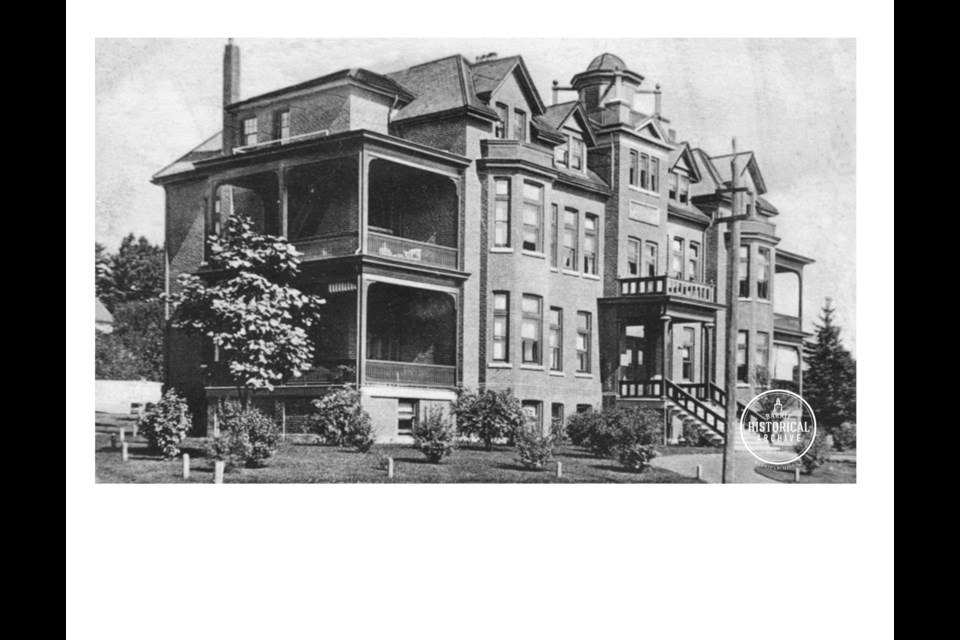“The local health authorities are taking vigorous steps to check the epidemic.”
Yes, and we would expect to see these words used often in print and online as our government branches attempt to get a handle on this novel virus.
“Public places have been closed including the schools, churches, the public library and other places frequented by the public.”
These preventative measures sound as if they could have been announced this afternoon but, in fact, they are lifted from the pages of the Northern Advance of Oct. 31, 1918, as the Spanish flu began its unwelcome visit to Simcoe County.
Barrie had been, for a long time, a sheltered little place with the troubles of the world usually far away from its tranquil lakeside setting.
By 1918, the Great War had brought the troubles of other places to the doorsteps of Barrie residents as wounded sons returned from European battlefields. Sometimes, only a telegram came.
Marguerite Irene Powell was born in Barrie to merchant David Powell and his wife, Catherine O’Neill, on Christmas Eve 1890. Little Marguerite arrived into a large family, all regular parishioners of St. Mary’s Roman Catholic Church.
The family lived for a time on Bayfield St., and later at 49 Clapperton St., which was part of the former H-Block. The Powells were comfortable enough and could afford to employ a servant or two.
For more than 30 years, David Powell ran a series of successful dry goods stores on Dunlop Street – Frawley & Powell, Powell & Hook, Powell & Co.
Two of his children, Marguerite and his eldest son, Charles, took an interest in the field of medicine. Charles Powell trained to be a doctor and inspired his sister, a decade his junior, to become a nurse. As a 19-year-old, Marguerite travelled to Philadelphia, Pa., and began her training at St. Timothy’s Hospital there.
After graduation, Marguerite Powell returned to her family in Barrie. It was likely through her father’s business that she met a young salesman from London, Ont., by the name of Alfred Bramwood Pocock.
In September 1916, Marguerite and Alfred became engaged and on Oct. 4, the couple married at St. Mary’s.
The Northern Advance described the morning wedding in its Oct. 12 edition.
“The bride was dressed in white georgette crepe and taffeta, with a black and white picture hat, and a bouquet of lily of the valley and pink rosebuds. After the ceremony, breakfast was served at the home of the bride.”
Immediately, the newlyweds were off on the 12:40 train to London, Ont., and afterwards travelled to Winnipeg, Man., where Alfred had work in a shoe shop.
In a year, they were the parents of a baby boy, John Joseph. Marguerite would have been maintaining the home and chasing after her toddler son in 1918 when she began to hear about a situation in her adopted city that threatened the health of everyone in it.
The Spanish flu had killed many in its rampage through battlefields and military hospitals in Europe before turning its fury to other lands. The first wave had hit Canada that spring but mercifully had missed Winnipeg.
In early October 1918, soldiers on a westward train passing through the city began to take ill. They were left behind in Winnipeg and soon they began to die. Not only had the Spanish flu arrived in Winnipeg, but a particularly virulent strain had come calling.
As the virus spread, the community struggled to cope. No real health-care system yet existed in Canada, but it did come into being about a year later, largely as a result of this pandemic. Many doctors were still overseas as a result of the war.
A volunteer brigade, consisting of some 650 Winnipeg women, began to care for the sick and quarantined. Marguerite, as a trained nurse, could not ignore the call to join.
When Marguerite first began to volunteer, she worked both night and day for two solid weeks. Her brother-in-law, W.J. Pocock, had a car and he offered to drive her to her patients. He later said that they regularly made 30 calls a day.
Then, Marguerite took ill herself. Alfred also took sick and so did little John Joseph. Dr. Charles Powell learned of the family’s condition and came from his practice in Port Arthur, Ont., to care for them.
After 11 days of extreme illness, Marguerite Pocock passed away. Her husband and son managed to survive that killer virus that often took away the young and strong.
Back home in Barrie, the Powell family mourned.
Dr. Little, medical officer of health, proclaimed that Barrie had seen much less distress than other cities and towns and expressed that the disease seemed to be subsiding. Churches were expected to re-open within the week.
The doctor pointed out that Barrie had only suffered one death from all the cases of influenza in the town. Only Dalton McConkey, a travelling salesman, had passed away after having “contracted the disease outside of Barrie.”
Dalton McConkey died on Oct. 27, from influenza and pneumonia, according to his death registration, as did Annie Thompson on Nov. 3, Pasquale Guerra and Hilda Jeffries on Nov. 4, Aldon Skinner on Nov. 10, and dozens more through December and into the new year.
The doctor may have been a little bit prematurely hopeful.
Each week, the Barrie Historical Archive provides BarrieToday readers with a glimpse of the city’s past. This unique column features photos and stories from years gone by and is sure to appeal to the historian in each of us.



